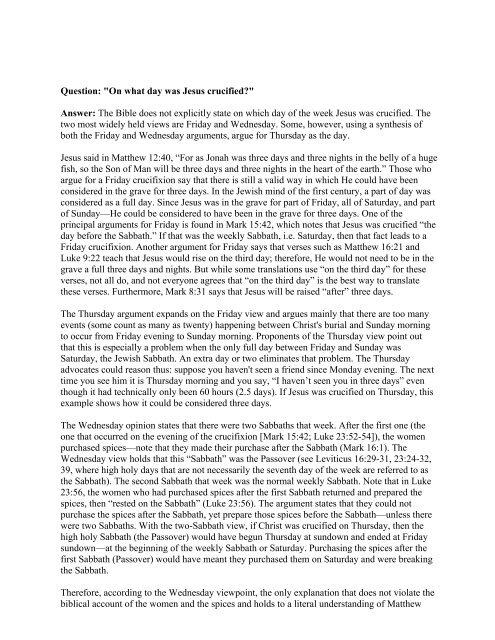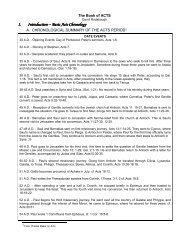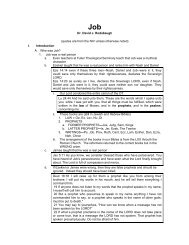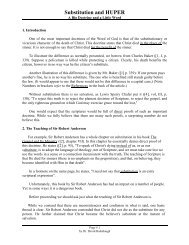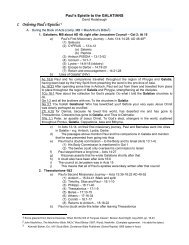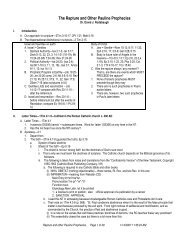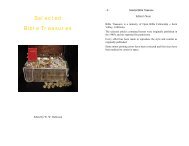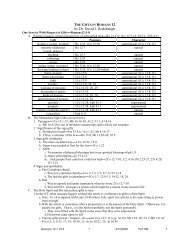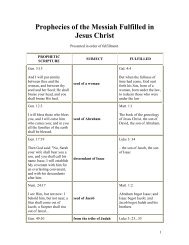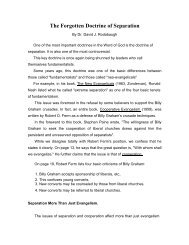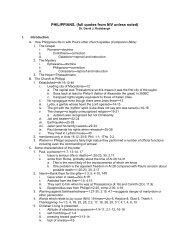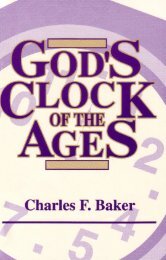Question: "On what day was Jesus crucified ... - Hope of the Glory
Question: "On what day was Jesus crucified ... - Hope of the Glory
Question: "On what day was Jesus crucified ... - Hope of the Glory
You also want an ePaper? Increase the reach of your titles
YUMPU automatically turns print PDFs into web optimized ePapers that Google loves.
<strong>Question</strong>: "<strong>On</strong> <strong>what</strong> <strong>day</strong> <strong>was</strong> <strong>Jesus</strong> <strong>crucified</strong>?"<br />
Answer: The Bible does not explicitly state on which <strong>day</strong> <strong>of</strong> <strong>the</strong> week <strong>Jesus</strong> <strong>was</strong> <strong>crucified</strong>. The<br />
two most widely held views are Fri<strong>day</strong> and Wednes<strong>day</strong>. Some, however, using a syn<strong>the</strong>sis <strong>of</strong><br />
both <strong>the</strong> Fri<strong>day</strong> and Wednes<strong>day</strong> arguments, argue for Thurs<strong>day</strong> as <strong>the</strong> <strong>day</strong>.<br />
<strong>Jesus</strong> said in Mat<strong>the</strong>w 12:40, “For as Jonah <strong>was</strong> three <strong>day</strong>s and three nights in <strong>the</strong> belly <strong>of</strong> a huge<br />
fish, so <strong>the</strong> Son <strong>of</strong> Man will be three <strong>day</strong>s and three nights in <strong>the</strong> heart <strong>of</strong> <strong>the</strong> earth.” Those who<br />
argue for a Fri<strong>day</strong> crucifixion say that <strong>the</strong>re is still a valid way in which He could have been<br />
considered in <strong>the</strong> grave for three <strong>day</strong>s. In <strong>the</strong> Jewish mind <strong>of</strong> <strong>the</strong> first century, a part <strong>of</strong> <strong>day</strong> <strong>was</strong><br />
considered as a full <strong>day</strong>. Since <strong>Jesus</strong> <strong>was</strong> in <strong>the</strong> grave for part <strong>of</strong> Fri<strong>day</strong>, all <strong>of</strong> Satur<strong>day</strong>, and part<br />
<strong>of</strong> Sun<strong>day</strong>—He could be considered to have been in <strong>the</strong> grave for three <strong>day</strong>s. <strong>On</strong>e <strong>of</strong> <strong>the</strong><br />
principal arguments for Fri<strong>day</strong> is found in Mark 15:42, which notes that <strong>Jesus</strong> <strong>was</strong> <strong>crucified</strong> “<strong>the</strong><br />
<strong>day</strong> before <strong>the</strong> Sabbath.” If that <strong>was</strong> <strong>the</strong> weekly Sabbath, i.e. Satur<strong>day</strong>, <strong>the</strong>n that fact leads to a<br />
Fri<strong>day</strong> crucifixion. Ano<strong>the</strong>r argument for Fri<strong>day</strong> says that verses such as Mat<strong>the</strong>w 16:21 and<br />
Luke 9:22 teach that <strong>Jesus</strong> would rise on <strong>the</strong> third <strong>day</strong>; <strong>the</strong>refore, He would not need to be in <strong>the</strong><br />
grave a full three <strong>day</strong>s and nights. But while some translations use “on <strong>the</strong> third <strong>day</strong>” for <strong>the</strong>se<br />
verses, not all do, and not everyone agrees that “on <strong>the</strong> third <strong>day</strong>” is <strong>the</strong> best way to translate<br />
<strong>the</strong>se verses. Fur<strong>the</strong>rmore, Mark 8:31 says that <strong>Jesus</strong> will be raised “after” three <strong>day</strong>s.<br />
The Thurs<strong>day</strong> argument expands on <strong>the</strong> Fri<strong>day</strong> view and argues mainly that <strong>the</strong>re are too many<br />
events (some count as many as twenty) happening between Christ's burial and Sun<strong>day</strong> morning<br />
to occur from Fri<strong>day</strong> evening to Sun<strong>day</strong> morning. Proponents <strong>of</strong> <strong>the</strong> Thurs<strong>day</strong> view point out<br />
that this is especially a problem when <strong>the</strong> only full <strong>day</strong> between Fri<strong>day</strong> and Sun<strong>day</strong> <strong>was</strong><br />
Satur<strong>day</strong>, <strong>the</strong> Jewish Sabbath. An extra <strong>day</strong> or two eliminates that problem. The Thurs<strong>day</strong><br />
advocates could reason thus: suppose you haven't seen a friend since Mon<strong>day</strong> evening. The next<br />
time you see him it is Thurs<strong>day</strong> morning and you say, “I haven’t seen you in three <strong>day</strong>s” even<br />
though it had technically only been 60 hours (2.5 <strong>day</strong>s). If <strong>Jesus</strong> <strong>was</strong> <strong>crucified</strong> on Thurs<strong>day</strong>, this<br />
example shows how it could be considered three <strong>day</strong>s.<br />
The Wednes<strong>day</strong> opinion states that <strong>the</strong>re were two Sabbaths that week. After <strong>the</strong> first one (<strong>the</strong><br />
one that occurred on <strong>the</strong> evening <strong>of</strong> <strong>the</strong> crucifixion [Mark 15:42; Luke 23:52-54]), <strong>the</strong> women<br />
purchased spices—note that <strong>the</strong>y made <strong>the</strong>ir purchase after <strong>the</strong> Sabbath (Mark 16:1). The<br />
Wednes<strong>day</strong> view holds that this “Sabbath” <strong>was</strong> <strong>the</strong> Passover (see Leviticus 16:29-31, 23:24-32,<br />
39, where high holy <strong>day</strong>s that are not necessarily <strong>the</strong> seventh <strong>day</strong> <strong>of</strong> <strong>the</strong> week are referred to as<br />
<strong>the</strong> Sabbath). The second Sabbath that week <strong>was</strong> <strong>the</strong> normal weekly Sabbath. Note that in Luke<br />
23:56, <strong>the</strong> women who had purchased spices after <strong>the</strong> first Sabbath returned and prepared <strong>the</strong><br />
spices, <strong>the</strong>n “rested on <strong>the</strong> Sabbath” (Luke 23:56). The argument states that <strong>the</strong>y could not<br />
purchase <strong>the</strong> spices after <strong>the</strong> Sabbath, yet prepare those spices before <strong>the</strong> Sabbath—unless <strong>the</strong>re<br />
were two Sabbaths. With <strong>the</strong> two-Sabbath view, if Christ <strong>was</strong> <strong>crucified</strong> on Thurs<strong>day</strong>, <strong>the</strong>n <strong>the</strong><br />
high holy Sabbath (<strong>the</strong> Passover) would have begun Thurs<strong>day</strong> at sundown and ended at Fri<strong>day</strong><br />
sundown—at <strong>the</strong> beginning <strong>of</strong> <strong>the</strong> weekly Sabbath or Satur<strong>day</strong>. Purchasing <strong>the</strong> spices after <strong>the</strong><br />
first Sabbath (Passover) would have meant <strong>the</strong>y purchased <strong>the</strong>m on Satur<strong>day</strong> and were breaking<br />
<strong>the</strong> Sabbath.<br />
Therefore, according to <strong>the</strong> Wednes<strong>day</strong> viewpoint, <strong>the</strong> only explanation that does not violate <strong>the</strong><br />
biblical account <strong>of</strong> <strong>the</strong> women and <strong>the</strong> spices and holds to a literal understanding <strong>of</strong> Mat<strong>the</strong>w
12:40, is that Christ <strong>was</strong> <strong>crucified</strong> on Wednes<strong>day</strong>. The Sabbath that <strong>was</strong> a high holy <strong>day</strong><br />
(Passover) occurred on Thurs<strong>day</strong>, <strong>the</strong> women purchased spices (after that) on Fri<strong>day</strong> and<br />
returned and prepared <strong>the</strong> spices on <strong>the</strong> same <strong>day</strong>, <strong>the</strong>y rested on Satur<strong>day</strong> which <strong>was</strong> <strong>the</strong> weekly<br />
Sabbath, <strong>the</strong>n brought <strong>the</strong> spices to <strong>the</strong> tomb early Sun<strong>day</strong>. <strong>Jesus</strong> <strong>was</strong> buried near sundown on<br />
Wednes<strong>day</strong>, which began Thurs<strong>day</strong> in <strong>the</strong> Jewish calendar. Using a Jewish calendar, you have<br />
Thurs<strong>day</strong> night (night one), Thurs<strong>day</strong> <strong>day</strong> (<strong>day</strong> one), Fri<strong>day</strong> night (night two), Fri<strong>day</strong> <strong>day</strong> (<strong>day</strong><br />
two), Satur<strong>day</strong> night (night three), Satur<strong>day</strong> <strong>day</strong> (<strong>day</strong> three). We do not know exactly when He<br />
rose, but we do know that it <strong>was</strong> before sunrise on Sun<strong>day</strong> (John 20:1, Mary Magdalene came<br />
“while it <strong>was</strong> still dark”), so He could have risen as early as just after sunset Satur<strong>day</strong> evening,<br />
which began <strong>the</strong> first <strong>day</strong> <strong>of</strong> <strong>the</strong> week to <strong>the</strong> Jews.<br />
A possible problem with <strong>the</strong> Wednes<strong>day</strong> view is that <strong>the</strong> disciples who walked with <strong>Jesus</strong> on <strong>the</strong><br />
road to Emmaus did so on “<strong>the</strong> same <strong>day</strong>” <strong>of</strong> His resurrection (Luke 24:13). The disciples, who<br />
do not recognize <strong>Jesus</strong>, tell Him <strong>of</strong> <strong>Jesus</strong>' crucifixion (24:21) and say that “to<strong>day</strong> is <strong>the</strong> third <strong>day</strong><br />
since <strong>the</strong>se things happened” (24:22). Wednes<strong>day</strong> to Sun<strong>day</strong> is four <strong>day</strong>s. A possible explanation<br />
is that <strong>the</strong>y may have been counting since Wednes<strong>day</strong> evening at Christ's burial, which begins<br />
<strong>the</strong> Jewish Thurs<strong>day</strong>, and Thurs<strong>day</strong> to Sun<strong>day</strong> could be counted as three <strong>day</strong>s.<br />
In <strong>the</strong> grand scheme <strong>of</strong> things, it is not all that important to know <strong>what</strong> <strong>day</strong> <strong>of</strong> <strong>the</strong> week Christ<br />
<strong>was</strong> <strong>crucified</strong>. If it were very important, <strong>the</strong>n God's Word would have clearly communicated <strong>the</strong><br />
<strong>day</strong> and timeframe. What is important is that He did die and that He physically, bodily rose from<br />
<strong>the</strong> dead. What is equally important is <strong>the</strong> reason He died—to take <strong>the</strong> punishment that all<br />
sinners deserve. John 3:16 and 3:36 both proclaim that putting your trust in Him results in<br />
eternal life! This is equally true whe<strong>the</strong>r He <strong>was</strong> <strong>crucified</strong> on a Wednes<strong>day</strong>, Thurs<strong>day</strong>, or Fri<strong>day</strong>.<br />
Recommended Resource: The Case for <strong>the</strong> Resurrection <strong>of</strong> <strong>Jesus</strong> by Gary Habermas.<br />
Related Topics:<br />
Is <strong>the</strong> resurrection <strong>of</strong> <strong>Jesus</strong> Christ true?<br />
Where <strong>was</strong> <strong>Jesus</strong> for <strong>the</strong> three <strong>day</strong>s between His death and resurrection?<br />
Who <strong>was</strong> responsible for Christ's death?<br />
Why did <strong>Jesus</strong> have to experience so much suffering?<br />
How is <strong>Jesus</strong> Christ unique?<br />
Return to:<br />
<strong>Question</strong>s about <strong>Jesus</strong> Christ<br />
Return to:<br />
Got<strong>Question</strong>s.org Home
<strong>Question</strong>: "<strong>On</strong> <strong>what</strong> <strong>day</strong> <strong>was</strong> <strong>Jesus</strong> <strong>crucified</strong>?"<br />
Answer: The Bible does not explicitly state on which <strong>day</strong> <strong>of</strong> <strong>the</strong> week <strong>Jesus</strong> <strong>was</strong> <strong>crucified</strong>. The<br />
two most widely held views are Fri<strong>day</strong> and Wednes<strong>day</strong>. Some, however, using a syn<strong>the</strong>sis <strong>of</strong><br />
both <strong>the</strong> Fri<strong>day</strong> and Wednes<strong>day</strong> arguments, argue for Thurs<strong>day</strong> as <strong>the</strong> <strong>day</strong>.<br />
<strong>Jesus</strong> said in Mat<strong>the</strong>w 12:40, “For as Jonah <strong>was</strong> three <strong>day</strong>s and three nights in <strong>the</strong> belly <strong>of</strong> a huge<br />
fish, so <strong>the</strong> Son <strong>of</strong> Man will be three <strong>day</strong>s and three nights in <strong>the</strong> heart <strong>of</strong> <strong>the</strong> earth.” Those who<br />
argue for a Fri<strong>day</strong> crucifixion say that <strong>the</strong>re is still a valid way in which He could have been<br />
considered in <strong>the</strong> grave for three <strong>day</strong>s. In <strong>the</strong> Jewish mind <strong>of</strong> <strong>the</strong> first century, a part <strong>of</strong> <strong>day</strong> <strong>was</strong><br />
considered as a full <strong>day</strong>. Since <strong>Jesus</strong> <strong>was</strong> in <strong>the</strong> grave for part <strong>of</strong> Fri<strong>day</strong>, all <strong>of</strong> Satur<strong>day</strong>, and part<br />
<strong>of</strong> Sun<strong>day</strong>—He could be considered to have been in <strong>the</strong> grave for three <strong>day</strong>s. <strong>On</strong>e <strong>of</strong> <strong>the</strong><br />
principal arguments for Fri<strong>day</strong> is found in Mark 15:42, which notes that <strong>Jesus</strong> <strong>was</strong> <strong>crucified</strong> “<strong>the</strong><br />
<strong>day</strong> before <strong>the</strong> Sabbath.” If that <strong>was</strong> <strong>the</strong> weekly Sabbath, i.e. Satur<strong>day</strong>, <strong>the</strong>n that fact leads to a<br />
Fri<strong>day</strong> crucifixion. Ano<strong>the</strong>r argument for Fri<strong>day</strong> says that verses such as Mat<strong>the</strong>w 16:21 and<br />
Luke 9:22 teach that <strong>Jesus</strong> would rise on <strong>the</strong> third <strong>day</strong>; <strong>the</strong>refore, He would not need to be in <strong>the</strong><br />
grave a full three <strong>day</strong>s and nights. But while some translations use “on <strong>the</strong> third <strong>day</strong>” for <strong>the</strong>se<br />
verses, not all do, and not everyone agrees that “on <strong>the</strong> third <strong>day</strong>” is <strong>the</strong> best way to translate<br />
<strong>the</strong>se verses. Fur<strong>the</strong>rmore, Mark 8:31 says that <strong>Jesus</strong> will be raised “after” three <strong>day</strong>s.<br />
The Thurs<strong>day</strong> argument expands on <strong>the</strong> Fri<strong>day</strong> view and argues mainly that <strong>the</strong>re are too many<br />
events (some count as many as twenty) happening between Christ's burial and Sun<strong>day</strong> morning<br />
to occur from Fri<strong>day</strong> evening to Sun<strong>day</strong> morning. Proponents <strong>of</strong> <strong>the</strong> Thurs<strong>day</strong> view point out<br />
that this is especially a problem when <strong>the</strong> only full <strong>day</strong> between Fri<strong>day</strong> and Sun<strong>day</strong> <strong>was</strong><br />
Satur<strong>day</strong>, <strong>the</strong> Jewish Sabbath. An extra <strong>day</strong> or two eliminates that problem. The Thurs<strong>day</strong><br />
advocates could reason thus: suppose you haven't seen a friend since Mon<strong>day</strong> evening. The next<br />
time you see him it is Thurs<strong>day</strong> morning and you say, “I haven’t seen you in three <strong>day</strong>s” even<br />
though it had technically only been 60 hours (2.5 <strong>day</strong>s). If <strong>Jesus</strong> <strong>was</strong> <strong>crucified</strong> on Thurs<strong>day</strong>, this<br />
example shows how it could be considered three <strong>day</strong>s.<br />
The Wednes<strong>day</strong> opinion states that <strong>the</strong>re were two Sabbaths that week. After <strong>the</strong> first one (<strong>the</strong><br />
one that occurred on <strong>the</strong> evening <strong>of</strong> <strong>the</strong> crucifixion [Mark 15:42; Luke 23:52-54]), <strong>the</strong> women<br />
purchased spices—note that <strong>the</strong>y made <strong>the</strong>ir purchase after <strong>the</strong> Sabbath (Mark 16:1). The<br />
Wednes<strong>day</strong> view holds that this “Sabbath” <strong>was</strong> <strong>the</strong> Passover (see Leviticus 16:29-31, 23:24-32,<br />
39, where high holy <strong>day</strong>s that are not necessarily <strong>the</strong> seventh <strong>day</strong> <strong>of</strong> <strong>the</strong> week are referred to as<br />
<strong>the</strong> Sabbath). The second Sabbath that week <strong>was</strong> <strong>the</strong> normal weekly Sabbath. Note that in Luke<br />
23:56, <strong>the</strong> women who had purchased spices after <strong>the</strong> first Sabbath returned and prepared <strong>the</strong><br />
spices, <strong>the</strong>n “rested on <strong>the</strong> Sabbath” (Luke 23:56). The argument states that <strong>the</strong>y could not<br />
purchase <strong>the</strong> spices after <strong>the</strong> Sabbath, yet prepare those spices before <strong>the</strong> Sabbath—unless <strong>the</strong>re<br />
were two Sabbaths. With <strong>the</strong> two-Sabbath view, if Christ <strong>was</strong> <strong>crucified</strong> on Thurs<strong>day</strong>, <strong>the</strong>n <strong>the</strong><br />
high holy Sabbath (<strong>the</strong> Passover) would have begun Thurs<strong>day</strong> at sundown and ended at Fri<strong>day</strong><br />
sundown—at <strong>the</strong> beginning <strong>of</strong> <strong>the</strong> weekly Sabbath or Satur<strong>day</strong>. Purchasing <strong>the</strong> spices after <strong>the</strong><br />
first Sabbath (Passover) would have meant <strong>the</strong>y purchased <strong>the</strong>m on Satur<strong>day</strong> and were breaking<br />
<strong>the</strong> Sabbath.<br />
Therefore, according to <strong>the</strong> Wednes<strong>day</strong> viewpoint, <strong>the</strong> only explanation that does not violate <strong>the</strong><br />
biblical account <strong>of</strong> <strong>the</strong> women and <strong>the</strong> spices and holds to a literal understanding <strong>of</strong> Mat<strong>the</strong>w
12:40, is that Christ <strong>was</strong> <strong>crucified</strong> on Wednes<strong>day</strong>. The Sabbath that <strong>was</strong> a high holy <strong>day</strong><br />
(Passover) occurred on Thurs<strong>day</strong>, <strong>the</strong> women purchased spices (after that) on Fri<strong>day</strong> and<br />
returned and prepared <strong>the</strong> spices on <strong>the</strong> same <strong>day</strong>, <strong>the</strong>y rested on Satur<strong>day</strong> which <strong>was</strong> <strong>the</strong> weekly<br />
Sabbath, <strong>the</strong>n brought <strong>the</strong> spices to <strong>the</strong> tomb early Sun<strong>day</strong>. <strong>Jesus</strong> <strong>was</strong> buried near sundown on<br />
Wednes<strong>day</strong>, which began Thurs<strong>day</strong> in <strong>the</strong> Jewish calendar. Using a Jewish calendar, you have<br />
Thurs<strong>day</strong> night (night one), Thurs<strong>day</strong> <strong>day</strong> (<strong>day</strong> one), Fri<strong>day</strong> night (night two), Fri<strong>day</strong> <strong>day</strong> (<strong>day</strong><br />
two), Satur<strong>day</strong> night (night three), Satur<strong>day</strong> <strong>day</strong> (<strong>day</strong> three). We do not know exactly when He<br />
rose, but we do know that it <strong>was</strong> before sunrise on Sun<strong>day</strong> (John 20:1, Mary Magdalene came<br />
“while it <strong>was</strong> still dark”), so He could have risen as early as just after sunset Satur<strong>day</strong> evening,<br />
which began <strong>the</strong> first <strong>day</strong> <strong>of</strong> <strong>the</strong> week to <strong>the</strong> Jews.<br />
A possible problem with <strong>the</strong> Wednes<strong>day</strong> view is that <strong>the</strong> disciples who walked with <strong>Jesus</strong> on <strong>the</strong><br />
road to Emmaus did so on “<strong>the</strong> same <strong>day</strong>” <strong>of</strong> His resurrection (Luke 24:13). The disciples, who<br />
do not recognize <strong>Jesus</strong>, tell Him <strong>of</strong> <strong>Jesus</strong>' crucifixion (24:21) and say that “to<strong>day</strong> is <strong>the</strong> third <strong>day</strong><br />
since <strong>the</strong>se things happened” (24:22). Wednes<strong>day</strong> to Sun<strong>day</strong> is four <strong>day</strong>s. A possible explanation<br />
is that <strong>the</strong>y may have been counting since Wednes<strong>day</strong> evening at Christ's burial, which begins<br />
<strong>the</strong> Jewish Thurs<strong>day</strong>, and Thurs<strong>day</strong> to Sun<strong>day</strong> could be counted as three <strong>day</strong>s.<br />
In <strong>the</strong> grand scheme <strong>of</strong> things, it is not all that important to know <strong>what</strong> <strong>day</strong> <strong>of</strong> <strong>the</strong> week Christ<br />
<strong>was</strong> <strong>crucified</strong>. If it were very important, <strong>the</strong>n God's Word would have clearly communicated <strong>the</strong><br />
<strong>day</strong> and timeframe. What is important is that He did die and that He physically, bodily rose from<br />
<strong>the</strong> dead. What is equally important is <strong>the</strong> reason He died—to take <strong>the</strong> punishment that all<br />
sinners deserve. John 3:16 and 3:36 both proclaim that putting your trust in Him results in<br />
eternal life! This is equally true whe<strong>the</strong>r He <strong>was</strong> <strong>crucified</strong> on a Wednes<strong>day</strong>, Thurs<strong>day</strong>, or Fri<strong>day</strong>.<br />
Recommended Resource: The Case for <strong>the</strong> Resurrection <strong>of</strong> <strong>Jesus</strong> by Gary Habermas.<br />
Related Topics:<br />
Is <strong>the</strong> resurrection <strong>of</strong> <strong>Jesus</strong> Christ true?<br />
Where <strong>was</strong> <strong>Jesus</strong> for <strong>the</strong> three <strong>day</strong>s between His death and resurrection?<br />
Who <strong>was</strong> responsible for Christ's death?<br />
Why did <strong>Jesus</strong> have to experience so much suffering?<br />
How is <strong>Jesus</strong> Christ unique?<br />
Return to:<br />
<strong>Question</strong>s about <strong>Jesus</strong> Christ<br />
Return to:<br />
Got<strong>Question</strong>s.org Home


